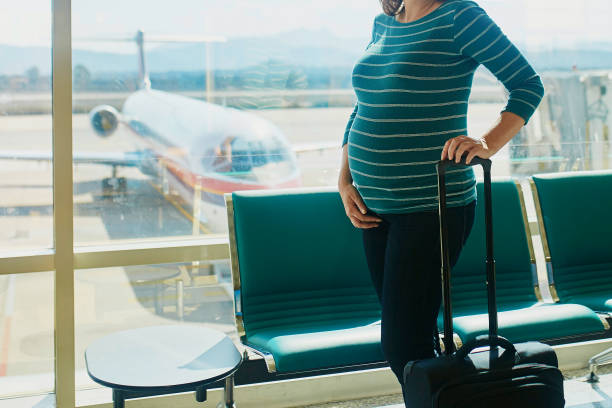If you are Pregnant! the second trimester is often considered the safest time for travel during pregnancy due to reduced risks of complications compared to the first and third trimesters. Consulting with a doctor is crucial, especially for high-risk pregnancies, and considering the standard of medical care at the destination is important for planning. It’s also wise to check healthcare arrangements and facilities
When could air travel pose risks?
Physicians typically advise against air travel for pregnant women with certain health conditions such as hypertension or a history of complications like miscarriage, premature labor, or ectopic pregnancy. Additionally, it’s not recommended for pregnant women to fly to areas with high altitudes, disease outbreaks (such as Zika or malaria), or where specific vaccinations are advised for travelers.
Extended journeys during pregnant
The recommendations for extended travel during pregnancy generally apply similarly to both domestic and local flights. However, international flights may have additional restrictions, particularly for women in their third trimester.
For instance, American Airlines mandates clearance from their special coordinator for international travel within four weeks of your due date or within seven days before or after your delivery. This clearance involves confirming a recent medical examination (within the last 48 hours before your flight) by a doctor to ensure you are fit to fly.
If you’re considering long-distance or international travel during pregnancy, the second trimester is typically regarded as the optimal time to do so.
Tips for safe travel during pregnant
Here are some tips for a safe and comfortable flight during pregnancy:
- Wear loose, comfortable clothing and flat shoes.
- Opt for an aisle seat for easier access to the restroom and to stretch your legs.
- Take short walks down the aisle every two hours to promote circulation.
- Avoid gas-producing foods and carbonated beverages before flying to reduce discomfort.
- Stay hydrated by bringing a refillable water bottle with you.
- Pack healthy snacks to keep your energy levels up during the flight.
It’s essential to consult with your doctor before traveling while pregnant to ensure it’s safe for you and your baby. Additionally, avoid traveling to areas with the Zika virus, and stay informed about travel advisories from reliable sources like the Centers for Disease Control and Prevention.
Before your trip, research nearby hospitals at your destination in case of emergencies, and consider bringing a copy of your prenatal records with you in case you need medical attention while away from home.
When To Fly during pregnant
Buckle up: Always wear your seatbelt during the flight, positioning it securely under your belly. This helps protect you in case of turbulence or other unexpected events.
Stay hydrated: Airplane cabins have low humidity levels, which can lead to dehydration. Drink plenty of water throughout the flight to stay hydrated and avoid discomfort.
Watch your diet: Avoiding gassy foods and drinks before flying can help minimize discomfort caused by gas expansion during flight. Opt for lighter, non-gassy options to ease any potential discomfort.
Plan for medical care: It’s important to think ahead about your obstetric care during the trip. Research medical facilities at your destination and consider bringing copies of your medical information, including any relevant prenatal records, in case you need care while you’re away.
Blood clots:
Air travel increases the risk of blood clots in the legs, especially for pregnant individuals. To mitigate this risk, it’s essential to keep your blood circulating. Get up and walk along the aisle every hour if possible. If you need to remain seated, regularly flex and extend your ankles. Avoid tight clothing, which can impede blood flow, and consider wearing compression stockings for improved circulation during long flights.
Radiation:
While radiation exposure from flying at high altitudes typically isn’t a concern for most pregnant passengers, frequent flyers like pilots and flight attendants may face higher levels of exposure. If you find yourself needing to fly often during pregnancy, it’s wise to discuss potential risks with your healthcare provider to ensure your safety and peace of mind.




